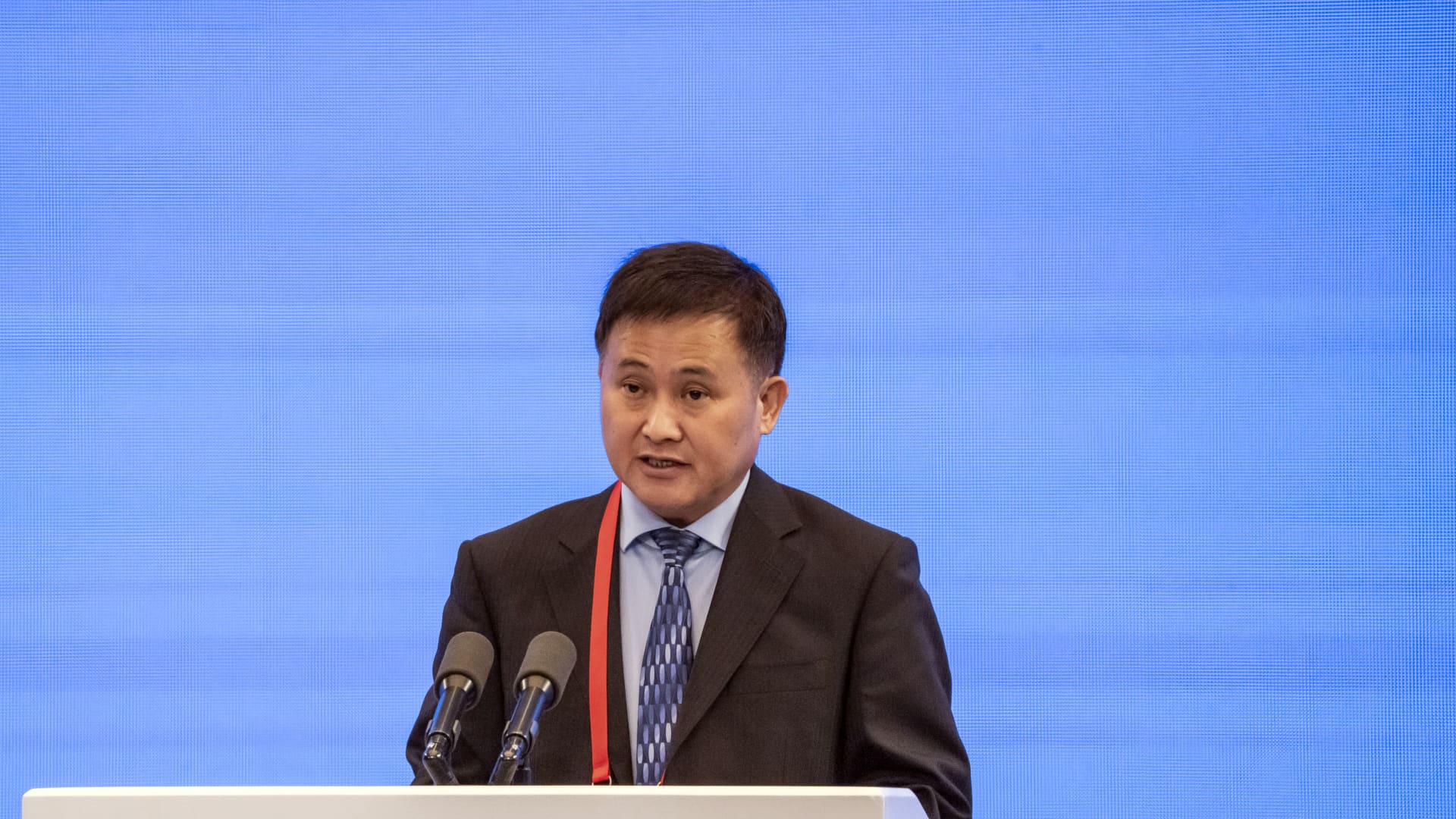Pan Gongsheng, governor of the People’s Bank of China (PBOC), during the Lujiazui Forum in Shanghai, China, on Wednesday, June 19, 2024.
Bloomberg | Bloomberg | Getty Images
BEIJING — China’s financial risks have dropped, including from local government debt, People’s Bank of China Governor Pan Gongsheng said in state media interviews published late Thursday.
Pan also said the central bank will work with the Ministry of Finance to enable China to reach its full-year growth targets. He said that monetary policy would remain supportive.
Beijing has increasingly prioritized addressing risks from high debt levels in the real estate sector, which is closely linked to local government finances. International institutions have long called on China to reduce its ballooning debt levels.
“China’s overall financial system is sound. The overall risk level has significantly declined,” Pan said in an interview released by state broadcaster CCTV. That’s according to a CNBC translation of the transcript.
He noted that “the number and debt levels of local government financing platforms are declining,” and that the cost of their debt burden has “dropped significantly.”
Local government financing vehicles emerged in China in the last two decades to enable local authorities, who couldn’t easily borrow directly, to fund infrastructure and other projects. LGFVs primarily obtained financing from shadow banking.
The lack of regulatory oversight often meant indiscriminate funding of infrastructure projects with limited financial return. That raised the debt burden on LGFVs, for which the local governments are responsible.
Coordinated efforts in the last year by local governments, financial institutions and investors have “alleviated the most pressing repayment needs of the weakest LGFVs and boosted market sentiment,” S&P Global Ratings analysts said in a July 25 report, one year since Beijing made a concerted effort to reduce LGFV risk.
However, the report said LGFV debt “remains a big problem.” The analysis found that more than 1 trillion yuan ($140 billion) of LGFV bonds are due to mature over the next couple of quarters, while such debt growth remains in the high single digits.
Exacerbating debt challenges is China’s slowing growth. The economy grew by 5% in the first half of the year, raising concerns among analysts that the country would not be able to reach its target of around 5% growth for the full year without additional stimulus.
The International Monetary Fund on Aug. 2 said in its regular review of China’s financial situation that macroeconomic policy should support domestic demand to mitigate debt risks.
“Small and medium-sized commercial and rural banks are the weak link in the large banking system,” the IMF report said, noting China has nearly 4,000 such banks that account for 25% of total banking system assets.
Addressing real estate
The number of high-risk small and medium-sized banks has dropped to half of what it was at their peak, Pan said via state media on Thursday, without sharing specific figures.
In real estate, he pointed out the mortgage down payment ratio has reached a record low of 15% in China, and that interest rates are also low. Pan noted central authorities are helping local governments with financing so they can acquire property and turn them into affordable housing or rental units.
Property and related sectors once accounted for at least one-fourth of China’s economy. But in recent years Beijing has sought to shift the country away from relying on real estate for growth, toward advanced tech and manufacturing.
Pan’s public comments come after a week of heightened volatility in the government bond market.
Earlier on Thursday, the PBOC made the rare decision to delay a rollover of its medium-term lending facility in favor of a 577.7 billion yuan capital injection via another tool called the 7-day reverse repurchase agreement. Pan highlighted that 7-day tool in June when discussing PBOC efforts to revamp its monetary policy structure.
The PBOC is scheduled Tuesday morning to release its monthly loan prime rate, another benchmark rate. The central bank cut the 1-year and 5-year loan prime rates by 10 basis points each in July, after keeping the 1-year unchanged for 10 straight months, and the 5-year unchanged for four months.

 Blog Post1 week ago
Blog Post1 week ago
 Economics1 week ago
Economics1 week ago
 Finance1 week ago
Finance1 week ago
 Personal Finance1 week ago
Personal Finance1 week ago
 Accounting1 week ago
Accounting1 week ago
 Economics1 week ago
Economics1 week ago
 Personal Finance6 days ago
Personal Finance6 days ago
 Personal Finance1 week ago
Personal Finance1 week ago










